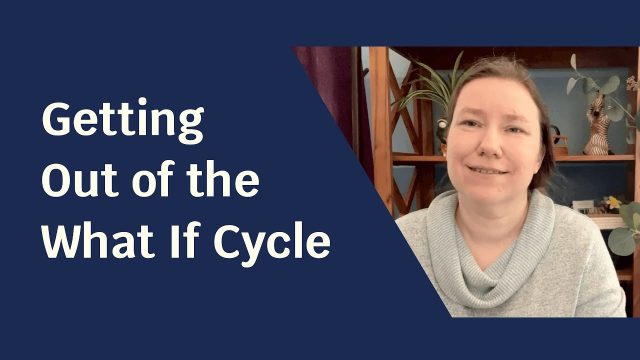
Stuck questioning what you could’ve done?
I’d like to talk for a moment about that cycle we can get into sometimes of constantly asking “what if?”, and feeling really guilty about things that we genuinely have little or no control over.
They stopped yelling, and at that moment a part of you learned that this is a tool that works. It makes things better.
Sometimes how we get into that is that at some earlier point in our life, maybe in childhood, maybe in adolescence, maybe in adult years, we were in a situation that was genuinely bad. There was probably an unequal power relationship, might have been with a parent, teacher, friend, or relationship partner. You took the blame for something and it actually did make the situation better, or at least on the surface.
Maybe they were yelling about something and you said, “Yeah, I should have done it this way”, or “I should have done that” and they quieted down. They stopped yelling, and at that moment a part of you learned that this is a tool that works. It makes things better. It gets you out of that horrible feeling.
So now, years later, maybe decades later, you’re in a situation that might be completely different, that person is no longer around and the circumstances could have nothing to do with that, but that part of you has learned that this is a tool that works and it can help you feel better when something bad has happened.
Taking the blame doesn’t actually make the situation any better because there’s not a person who can resolve the situation.
It’s leaning into that one tool so hard. It’s like that situation where if all you’ve got is a hammer, everything looks like a nail. It’s got this one tool and it’s trying to use it over and over. Though the difference is that, in the earlier situation, when you took the blame the other person stopped yelling, but here there’s no one to stop yelling. Taking the blame doesn’t actually make the situation any better because there’s not a person who can resolve the situation.
Maybe it’s a health issue, or your beloved pet passed away, or something happened to your kid, and just taking the blame doesn’t work anymore. So this part of you starts slipping back in on itself. It’s like, “Okay, if I can just find the right thing to take the blame for then I’ll get that relief. So what if I did this or what if I did that, or what if I had known about this?” And it keeps generating “what if?” questions, and they become this loop that has no resolution anymore.
Taking care of your younger self
There could be a lot of things going on, that’s just one possibility, but if this is resonating for you I’d like to suggest one potential way to break free of that loop. And that is basically to help that younger part of yourself to feel safe, so they’re not going to try and run the show anymore.
So this is gonna sound a little ‘woo-woo’, I get it. I found this super corny the first many times that I tried this, but it does work. Okay, so try to tune in to that part of yourself that is really just scared, and hurt, and trying to make things better. Can you find that part of you?.. The interesting thing here is that usually that part of us is not trying to hurt us. They’re not trying to send us into these mental loops, they’re not trying to do anything extreme. They’re just trying to protect us, but they’ve just got this one tool to do it.
The interesting thing here is that usually that part of us is not trying to hurt us.
So if you can find that part of you, I’m wondering how old that part of you feels. Do they feel like a kid? Like a six or seven year old? Do they feel like a 14-15 year old? Was this in your first relationship in your 20s? If you can find them, it could just be a vague feeling. It doesn’t have to be something any more specific than that.
Could you talk to them? Have a little dialogue? Could you talk to them in the way that you would talk to someone that you really care about? Someone that you respect and that you wish well?
You could say something like, “Hey, thanks so much for trying to protect us. I really appreciate it. And you know what? I got this one, because I’ve got more tools in my tool bag than I used to. I’ve learned a whole lot since then, and it may not feel like it, but it’s been a long time since that stuff happened. I know how to deal with things better, and I’m getting even better than that. So I really appreciate your help, but I’ve got this one. I can take care of it. I can take care of us.”
Remind them it’s OK
It’s important to remind this part of yourself that they don’t have to go away, they’re not getting banished, and you want them to be a part of you. You just don’t need them to do this job anymore, because you can handle it. They can stick around, they can stay right near you. They can watch you handling it and you can talk to them as you’re doing it, or just check in every once in a while and point out “Hey look, we did this. It worked, and we handled it better.”
You just don’t need them to do this job anymore, because you can handle it.
The more often that happens, and the more often they see that you’re actually taking care of things in healthier ways, the more they’ll feel comfortable letting go. So they’re not coming up and trying to run the whole show anymore. You can keep reminding them that you got this, “Look this thing happened, I took care of it and we’re good. We’re still here. I’m still here. We’re good.”
If you try this I’m curious to see what will happen for you. I hope that at least some part of this sparked an interesting idea for you, and I’d be curious to hear what that is. You’re welcome to leave a comment if you’d like to. You’re welcome to keep it to yourself, or discuss it with someone that you trust.




